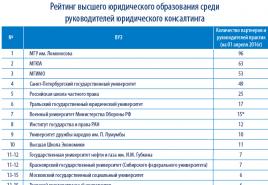What is the name of the lesson of labor at school now. Knitting needles for girls, planer for boys: What's wrong with school labor lessons
At the technology lesson, classes are divided into two groups: boys and girls. This happens for obvious reasons. Technology lessons teach children manual labor, which will be useful to them later in life. Labor is very different from that of boys. In order not to mix two different areas of activity, classes are divided into subgroups.
Lessons are held in different classrooms. Each group has its own teacher. As a rule, the teacher for boys is a man, and for girls - a woman.
Technology for girls
It is customary to call home economics technology lessons, since Soviet times. The subject got its name for what it teaches. The task of housekeeping is considered to be to help girls learn knowledge and practical skills that will be useful in the household and in everyday life, as well as to develop in children independence and many other qualities that every woman needs to possess.
The home economics program includes several sections: housekeeping, cutting and sewing, cooking, clothing care. The whole program is designed for seven years: starting from and ending with 11. Classes are held once a week and last 1 hour.
In the first half of the 5th grade, girls get acquainted with the device of a sewing machine, make patterns and try to sew the simplest things on their own. Every year the difficulty increases. Cutting and sewing in each class is given from 23 to 58 hours.
Beginning in the second half of each school year girls are taught how to cook. First, there is an acquaintance with kitchen equipment, as well as utensils. Every year the program becomes more difficult and teaches how to cook dishes of varying complexity: from vegetable sandwiches to the simplest fish and meat dishes. A mandatory component of each lesson is a theoretical part, during which the teacher introduces students to safety precautions, and also demonstrates products.
Technology for boys
Technology lessons for boys and girls are drastically different. Starting from the 5th grade, real men are brought up in boys who will be jacks of all trades.
From 5 to boys are taught to work with different materials and tools. Initially, they are introduced to the materials in principle. They tell the properties of wood and metals, and also show what tools they are processed with.
Starting from the 6th grade, under the guidance of a teacher, the boys begin to work independently with materials. Initially, there is an acquaintance with the tree. On practical exercises the teacher teaches how to make stools, and also teaches the techniques that are best used when working with wood.
By the end of grade 11, boys can make a wooden plane on their own, carve any toys on a special machine, and also perform decorative wood carving. They have the skills to process materials and work with them.
Once a week at school we parted ways with our male part of the class. The girls went to learn the basics of cutting, sewing and cooking, and the boys - to learn how to be masters in the house: hammer nails, make stools and hang shelves. In today's school, boys see hammers only in textbooks. Traditional labor lessons were replaced by computer science and technology. To find out what happened to labor lessons and why boys were no longer taught the basics of male home economics, I went to my native school No. 21.
Girls sit, sit in scarves
The labor office for girls remained in the same place as 16 years ago, when I first crossed its threshold. Sixth-graders sit in the classroom in the same aprons and scarves that we sewed. There are the same sewing machines on the tables, but the kitchen has been changed to a new one.
Labor teacher Tatyana Kuzmina talks about the training program: “From the 5th to the 7th grade, labor training is two hours a week, in the 8th grade it becomes more specialized. In the 5th grade, girls start from the basics: they study hand and machine seams, sew aprons. In the 6th grade we sew shirts, in the 7th grade we sew skirts, and in the 8th grade we sew puppet sundresses. Since classes are only one hour a week, we do not have time to make a large product. Eighth-graders can independently set up a sewing machine, insert a needle. We have lessons in materials science and modeling.”
Cooking in the new kitchen is probably more pleasant. But in our school years, we cooked with great pleasure on the old one. The first thing we learned was sandwiches and scrambled eggs. I fed my family with an omelette so that then it was not cooked for a long time. But with fresh sandwiches, we proudly treated our boys, who came running from a neighboring office. They enthusiastically told how they made clothes hangers themselves, in high school they were proud that they could fasten metal sheets, and we treated us with pastries in return.
Quizzes instead of nails and a hammer
For boys, labor lessons were replaced by a subject called "technology". The students here diligently sit at their desks, a textbook and notebooks are opened in front of them, they write something down, and then draw. No tools, no smell of wood, no sawdust, no metal. Only ink and paper. The technology lesson is taught by Elena Gavrilova. In the curriculum - theoretical study wood and metal processing. They also theoretically get acquainted with tools and materials. From 6th to 8th grade, boys study Computer techologies. Elena Vasilievna says that she tries to make the lessons interesting, conducts KVN games, quizzes and oral polls.
“Our school switched to technology lessons three years ago. Workshops have been dismantled at the school. The tools in them were traumatic. There were no accidents at our school, but I know that other schools had hand and eye injuries,” Elena Gavrilova said.
In the traditional form, "traumatic" lessons have been preserved in some schools in the Sergiev Posad region. Technical labor lessons for boys are conducted in 16 schools: No. 1, No. 6, No. 14, No. 16, No. 28, gymnasium No. 5, lyceum No. 24, Khotkovskaya school No. 1, Khotkovskaya school No. 5, Konstantinovskaya, Kuzminskaya, Samotovinsky, Torgashinsky , Shaburnovskaya, Shemetovskaya schools, as well as in the main general education school № 7.
Youtube will teach
It is obvious that when she comes home from technology lessons, her mother's assistant will not drive a nail into the wall and hang a shelf in the hallway. It turns out that the responsibility for teaching "male" skills lies with dads and grandfathers. You can also watch a video on Youtube and try to repeat the process.
For example, the video “How to fix a faucet if it drips” is in demand. In the age of technology on the Internet, you can find the answer to any question. But, it seems to me, there are things that can only be transmitted through personal communication from person to person. Not a single video blogger will tell the boy where he made a mistake and why his stool moved. Men with golden hands have been valued at all times, but apparently, in the near future, craftsmen will be rare specimens.
“Laziness is the basis of vice. A person must work with his soul, hands and head,” says Olga Vasilyeva, Minister of Education. And yet, in her opinion, schoolchildren need labor education: they must “work every hour, every second” and “get joy from their work.”
At the initiative of the Ministry of Education and Science, from 2017, schools should begin to introduce an hour of labor education as part of the subject "technology". About what the children will do in these lessons, the department has not yet reported. But the Minister of Education urged schools not to wait for orders from "above" and to start accustoming schoolchildren to work themselves.
Each of us has the right to choose what he will do in life. This refers to intellectual and mental labor. Some people are good at exact sciences, such as mathematics or chemistry, from school, while others are attracted to creative activity. So, "golden hands" also need to be developed.
Each of us remembers the lessons of labor that were before. They differ significantly from modern ones. Then the time was different, and the equipment of labor offices was at a higher level. Someone has positive memories of labor lessons, and someone does not want to remember those times, believing that it is long gone. Agree that a lot depends on the teacher. It is good when the mentor considers in time in his student creative personality and will help him and cheer for him. But it happens that the child needs to develop on his own, without anyone's help. Today, students have completely different hobbies, but this does not mean that there are no creative children among them who love to invent and craft.
The question arises: is there any benefit from labor lessons in schools? Is this item needed? Perhaps he no longer needs anyone? Many believe that in a few years this subject will no longer exist at all. Who needs to know how to hammer nails or use a planer? Majority modern people believes that there are special services for this, which will do everything that is needed for money. And in the online store http://domisad.com.ua/ you can buy all the necessary tools that are needed for home, office, garden or small city apartment.
In most cases, labor lessons are read by unskilled craftsmen, so these hours should be given to study some other subjects. Workshops in schools are not in the best condition. There are no materials, no modern tools. Why then waste time on a subject that no one needs?
Everyone is entitled to their opinion. Undoubtedly, labor lessons bring many benefits. Children can take a break from more complex subjects that tire them mentally. Labor lessons give elementary skills that are sure to come in handy in life. And flaws can be found in everything, if you look well. Few parents are outraged by the lack of labor lessons at school. But everyone wants their child to develop comprehensively and forget that physical labor contributes to mental development person.
Vkontakte
Odnoklassniki
Other news
School is easy and fun. Help your child love school.
Often, parents forget that it is necessary to prepare a child for school not only by buying books and equipment, but also mentally. How can you get your child interested in school? A few tips will help you with this.
11 Ways to Learn to Think Positively
Throughout life we are taught mathematics, foreign languages, history, but do not teach the main thing - to be happy people. Happiness is a positive mindset that can really be learned. One has only to want, and our brain will produce positive emotions at the first signal, as soon as we need them.
Social media makes children unhappy
Researchers from the UK have come to the conclusion that adolescent self-esteem largely depends on the amount of time spent on social networks.
How to stop craving sweets?
There is an effective method that can reduce the craving for sweets. In the course of a study conducted by American scientists, it was found that the level of addiction to sweets can be reduced in just 25 seconds.
Stop doing these 6 things and your relationship will last
There are 6 ways that can drive any relationship into a corner, and the only way to solve the problem is to break up. Some people recklessly do things that destroy their relationship. It is difficult to say why they do this: perhaps there is not enough strength of mind, perhaps education, wisdom or banal experience.
Movie news: 5 French comedies of 2017
Recently, France has started to produce really high-quality films that are worth watching. So we bring to your attention 10 films that you definitely need to devote an hour and a half in the evening.
Non-standard script for the christening of a child
Baptism of a child is one of major events in the life of not only the newborn, but also his parents. Of course, I would like this holiday to be remembered for a long time by all relatives and guests of this event. Today we will talk about a rather non-standard, but no less solemn version of the baptism of a child.
Should we hope for sex education lessons in Russian schools?
In the progressive countries of Europe, issues of sexual education of adolescents are approached with great responsibility: the discipline "Sexual relations" is an integral part of the school curriculum in the Netherlands and Germany. In Russia, however, there have been disputes around the prospect of introducing such a subject into the school curriculum for decades, while the opinions of adults on this matter are divided into two opposing camps: some believe that this discipline is mandatory, while for others, even talking about such a thing is peculiar. taboo.
The negative impact of Facebook on the human psyche
Social networks take up the lion's share of our time during the day. Of course, many of you will say that Facebook activity in the 21st century is normal. But the problem is that few users can distinguish addiction from use. At a certain moment, the smile of our friends changed into a smiley, and cursing became an example of caring and goodwill.
The history of school uniforms: how the clothes of Russian students changed
Currently, one of the mandatory requirements for students of general education institutions is the presence school uniform. After the collapse of the USSR, the usual pajamas, shirts and red ties faded into the background, and the young people themselves received complete freedom in choosing clothes. In 2013, the government of the Russian Federation decided to renew the compulsory wearing of school uniforms.
TASS, 15 November. Implementation new concept technology lesson proposed by the Agency for Strategic Initiatives (ASI) and the Union of Young Professionals (WorldSkills Russia), will require equipping schools with new equipment and retraining teachers, according to experts interviewed by TASS.
The project was presented in early November on the sidelines of the WorldSkills Hi-Tech Championship in Yekaterinburg. It involves the modernization of teaching methods of the subject and the development by students modern concepts. Experts note that a change in approaches will improve early career guidance due to the emergence of new directions, however, it is necessary to take a balanced approach to innovation, taking into account not only high technologies, but also traditional household skills, as well as national traditions of a number of regions.
Experiment in Moscow: lessons in technoparks
According to the concept, new lesson technologies will be directed to the implementation of projects in scientific and technical creativity, Svetlana Chupsheva, general director of ASI, told TASS. “The technology lesson that we offer is just the skills that will be useful to the child in his professional or ordinary life. It (the initiative - TASS note) has already been supported, methodological recommendations have been prepared and approved by the Ministry of Education, which will be broadcast in schools so that technology lessons are as effective as possible in terms of developing such skills in children,” she noted.
According to her, this year in Moscow, technology lessons have already been held on new program. “It is important that they were held not inside educational institutions, but in a technopark. It was very interesting for the children to implement projects in five key areas for three months: industrial design, smart home environment, robotics, and drones. We hope that technology lessons will be gradually introduced in all schools,” Chupsheva said.
Elena Tikhonova, director of the Center for Physics and Mathematics Education at the Russian Textbook Corporation, told TASS that the corporation is ready to develop a new line of educational and methodological kits, taking into account current changes and the concept of technological education.
"A modern technology textbook can be built on a modular basis. This will provide basic technological knowledge and, depending on the request of the region, opportunities educational organization, students' preferences to choose an additional module, for example, agrotechnological, robotics, service technologies. It is necessary to introduce a greater number of different developmental tasks into new textbooks, introduce them to the development and implementation of various projects, it is necessary to acquaint students with constantly updated types of technologies," Tikhonova specified.
Not everyone is ready. Several experts noted at once that in order to introduce a new concept of teaching, schools will need to be additionally equipped with modern equipment. According to the head of the department of additional education of the School of Pedagogy of the Far East federal university(FEFU) Galina Pavlenko, classes should be built as the development of modern technologies, and one of the promising methods of conducting them will be a game or simulation.
"Schools in the Primorsky Territory, in the overwhelming majority, are not ready to implement the new concept: they do not have the appropriate material base and a sufficient number of teachers ready to work under the conditions of the new concept. Training of labor teachers in universities at Far East is not conducted at all. When changing the approach to teaching, it is necessary to ensure the training of personnel for the implementation of the new concept, on the basis of pedagogical universities. At the same time, universities need additional material and technical conditions for the training of technology teachers," she said.
The head of the department is of the same opinion. vocational education and science management of education and science Lipetsk region Natalia Yushkova. “Of course, schools do not have such equipment, because it is not provided for by the authorities, for example, welding machines high level. But secondary vocational technical educational institutions can show their bases and offer to try to work on their equipment,” the agency’s interlocutor added.
According to Igor Vlasov, Associate Professor of the Department of Professional Education at the Kursk Institute of Education, the introduction of a new concept of teaching technology lessons in Kursk schools will cause certain difficulties, primarily due to a lack of staff and venues.
Regional experience
Some Russian regions are already independently organizing training in high-tech competencies as part of technology lessons. As Tatyana Vasilyeva, First Deputy Minister of Education of Karelia, told TASS, the republic has experience in the interaction of schools, colleges and enterprises in order to enable the student to master various skills and help them decide on their future profession.
"For example, students of school No. 39 in Petrozavodsk within the extracurricular activities received theoretical knowledge at school, then at a college or technical school they practiced practical skills in the modules "Cooking", "Machinist of road and construction machines", "Welders" and others. After that, the guys visited enterprises where they could apply these skills, got acquainted with a potential job," she said.
New approaches to conducting lessons have been used for several years in gymnasium No. 19 in Kurgan. “For example, in the eighth grade, boys learn the basics of robotics as part of a technology lesson. With the help of parents and sponsors, we purchased equipment for these lessons. The course is taught by a young teacher who owns modern technologies. We are currently thinking about acquiring a 3D printer,” Elena Smirnova, director of the educational institution, told TASS.
And in Bryansk region are already preparing educators ready to teach modern technologies. “All the technology teachers we train to work at school are able to give students the knowledge of how to model a 3D product on a computer and make it on a 3D printer. They can also give children knowledge in the field of robotics, but so far such enclaves of progressive teaching of advanced disciplines are concentrated not in schools, but in children's technical centers,” the agency’s interlocutor noted.
Balanced Approach
In general, the experts agreed that the concept of teaching technology in modern school needs improvement. However, the issue of uniting boys and girls in technology classes, given the emphasis on high technology, caused a mixed reaction.
Grigory Kapranov, Deputy Director for Research at the FEFU School of Pedagogy, believes that schoolchildren need to be prepared for life in a high-tech world, while not forgetting the skills that are needed in Everyday life, for example, in the household. “A straight-line change in the system of labor training to ignore the gender principle ... will do more harm than good,” he told TASS.
Abdurakhman Kaimov, Assistant Minister of Education of Chechnya, also believes that co-education of boys and girls in technology classes is not applicable to all regions. “From the point of view of the national mentality, there are moments in the republic that differ from other regions. This is my personal opinion, but co-education in technology in the Chechen Republic is not obligatory. There are things that are supposed to be done by a man or a woman, and these activities should not overlap, although the development of society presupposes the presence of common skills in some matters,” he said.
His position is shared by the head of the committee on education, culture and relations with religious organizations of the People's Assembly of Ingushetia, Maryam Amrieva. “I understand that there is a trend in world development and there is a blurring of lines between women and men. However, a girl should be brought up as a teacher of children and a keeper of the hearth, and boys should be brought up in the spirit of a defender of the hearth, the country and the people,” the agency’s interlocutor said.
At the same time, Kabardino-Balkaria is gradually moving to new standards for teaching labor lessons. “Our schools have already moved away from traditional labor lessons, where boys study separately from girls. We have robotics in many schools, not only boys, but also girls study there. As for teachers for such classes, in some schools they are specially retrained, in some they are recruiting new ones,” the regional Ministry of Education, Science and Youth Affairs told TASS.
In Dagestan, technology lessons are held in different formats. “The new standards for teaching technology lessons do not provide for division [by gender] as such. Now in Dagestan, technology is taught in different ways, as educational institutions they have the right to decide, in most of the schools there are combined lessons, somewhere else," Larisa Abramova, head of the general and vocational education department of the Ministry of Education and Science of Dagestan, told TASS.
Is LABOR needed in a modern school.
Each person has the opportunity to choose what he will do, physical or intellectual labor. Some are very good at mathematics and physics, others are not capable of these subjects, but they have something different, creative, they have “golden hands” that also need to be developed. Previously, at school there were labor lessons that were not the same as now. And the supply was at the level and the time was different.
Many even now remember labor lessons at school positively, while others do not. Agree, because a lot depends on what kind of teacher. And this applies to all subjects without exception. Personally, I have almost nothing to remember about my labor lessons. I vaguely remember doing something. But I was a creative student, then I went to a circle, I even remember making a steam engine. But I didn’t have a mentor who would root for this, help me. So I had to develop myself somehow. Now modern students have completely different interests and hobbies, but this does not mean that there are no creative boys, who invent something, who love to make things with their own hands. There are many, you can trust me.
And now let's discuss with you a little - is there any benefit from labor lessons or not, and why should or should not this subject be taught at school? Many say that this subject has already become obsolete. A few more years and work at school, like subject, may not be at all. Who now needs to hammer nails and use a planer? Who needs to saw and file? Repair something at home, nail a shelf or assemble furniture yourself. What for? Call a special person and he, for money, will do everything! Let this watch be given for other, more important items. After all, everyone knows what they turned into present stage labor lessons at school. There are no qualified teachers, most of them are taught by non-specialists, as a rule, as an additional burden. Workshops in desolation: no material, no tools, no machines, no visibility! Nothing! So why do we need such an object, from which there are only problems ?! Opinions, as always, differ. It turns out that there are pluses that indicate the need for the presence of this item in school curriculum. But there are also disadvantages. Let's take a look at what's actually more. Children, too, are not asked what they want to learn, but this is important. You will conduct a questionnaire in any school class on the topic "what subjects are needed in a modern school." The results will be very interesting. So let's still try to sort out with you the pros and cons of having labor lessons at school.
Advantages of a labor lesson:
- Allows children to take a break from other subjects that tire them mentally;
- Promotes the emergence of some skills and abilities necessary in adulthood;
— Unites children and teaches them to work in a team;
– Develops love for work and respect for working people;
- Allows you to be liberated, to feel like a creator;
- Develops the creative nature of the child;
- Teaches something new;
Develops the brain and muscle motor skills;
And much more…
Cons of labor lessons:
Not all teachers teach this subject with sufficient quality, which is why children have a hatred for labor lessons;
The program is not very interesting for children, there is little modern in it;
Children can be injured if safety precautions are not followed;
And a couple more, as Sharikov said.
In fact, there are also pros and cons, if you look for them. The main reason why labor lessons can be removed is economy. If you do not need to buy special equipment and materials, pay a salary to a teacher - this allows you to save. Parents are not very outraged about the lack of labor lessons, but all moms and dads want their children to develop mentally and receive in the future Good work. But, in fact, many people forget that physical labor only contributes to mental labor, improving its results. Physical work helps fight mental fatigue and "backwardness".
Also, labor allows you to determine the difference between mental and physical labor, as well as connect and compare them. This will allow children to decide better what they want to achieve in life, to work with their hands or with their heads. And, of course, labor develops skills that allow you to develop in all plans. Thus, school work is excellent. preparatory stage to life, to who you have to be and what you have to face. Labor must be present in the school, since its benefits are obvious to everyone.
Is it necessary to work at school?







